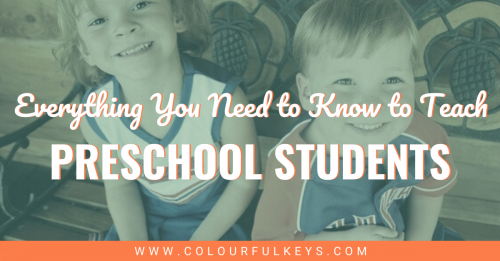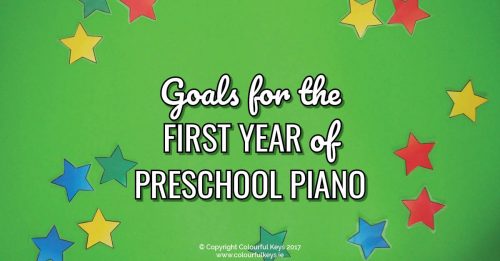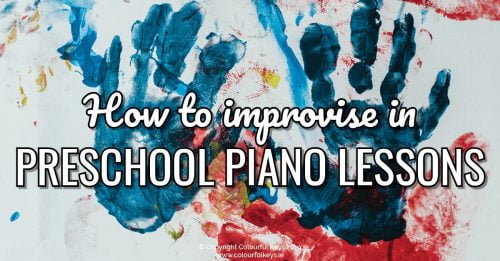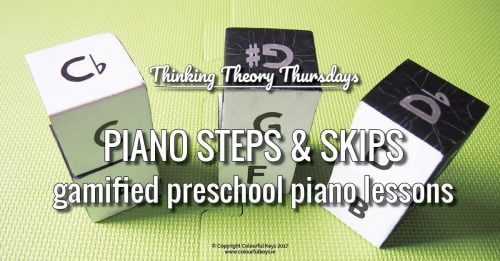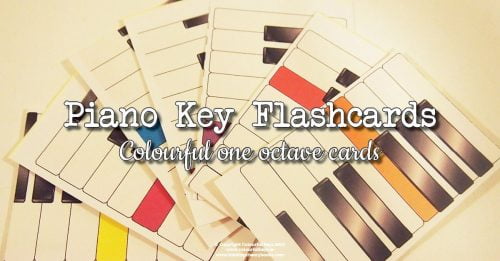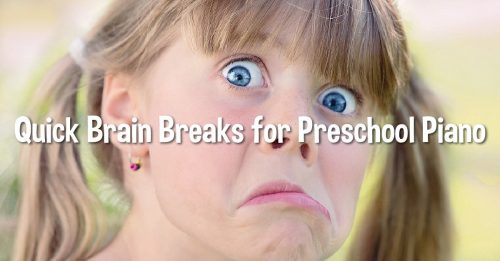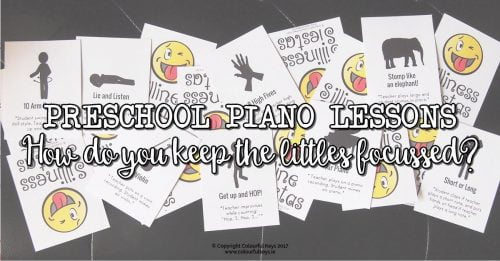Do you want to get into teaching preschool piano teaching? The 3- to 5-year-old crowd is not without it's challenges.
They might wiggle right off your bench, lose focus halfway through a sentence or have trouble using each finger individually. But they're also tons of fun and can learn so much at this age with the right approach.
Improve your teaching approach for preschool piano using these posts and you will be richly rewarded with beaming smiles and excited faces. If you need more, you might also like my book Playful Preschool Piano Teaching.
PLANNING
If we're going to teach preschoolers effectively, we need to have a plan. Turning pages in a method book simply won't do. But how do we set goals that are fun and achievable for our students?
GAMES AND ACTIVITIES
If we could pinpoint one reason I started this blog in the first place it would be this: to share games and activities that actually work for your littlest students. Here are some of my favourites for preschoolers.
FOCUS
Whenever I talk about teaching preschool piano lessons, I get questions about "the wiggles". So, how do we prevent them? And how can we keep preschoolers engaged and on-task?
-
Access the Mini Musicians course!
Become a member of Vibrant Music Teaching and get instant access to this 40-week course and materials so you can teach group preschool for an entire year (including marketing images!) as well as tons of other lesson plans, resources and games.
The Benefits of Preschool Piano Teaching
As preschool piano teaching has increased in popularity in recent years, there are still many who believe it's a waste of time. In fact, it's pretty much impossible for the topic to come up in a discussion without someone saying either:
- They will only teach a preschooler who is ready...and most aren't ready
- They prefer to start students at age 8 because they all end up in the same place by age 10, so isn't it a waste of parents' money to start 3 years earlier?
If you've come to this page you probably already believe there are benefits of starting students at preschool-age. But for those that aren't convinced (you can pass this message on if that's not you) let's tackle each of those objections one at a time.
Are preschoolers really "ready" for piano?
Well, here's where I have to do that annoying thing of answering a question with another question: ready for what?
If we're asking whether the average 3- to 5- year-old child is ready to sit on a bench for 30 minutes and read pieces from a method book, and then go home and practice the same pieces without much parent support...then NO.
But who's really "ready" for that, anyhow?
That's how I started my own piano journey at age 7, so, I supposed we could say I was ready for that approach since I continued...but I also know that I would've made faster progress and enjoyed my lessons more if we had played games, improvised and used our imaginations.
So, what does it mean to be ready? Does it just mean that we can get through it? That hardly seems like a good benchmark for great teaching.
I believe that almost all preschoolers are ready for piano lessons, if the lessons are actually designed with them in mind. Preschool piano teaching should include fun and creativity and they should be fast-paced, moving quickly from one activity to the next.
The best part about all of this is that teaching preschoolers will make you a better teacher for all your students. We can all use more fun in our lives, even (and perhaps especially) the adults.
Don't they all end up in the same place by age 10?
When teachers or parents ask this question, they're usually actually talking about reading music. To which the answer is: yes, probably. A student who starts at age 5 and one who starts at age 8 could have fairly similar reading levels by age 10.
But this again leads to another question: Does teaching piano just mean teaching students to read music? Is that it?
Gosh, I hope not. I hope we're also trying to teach:
- Rhythm
- Ear training
- Musicianship
- Improvisation
- Technique
...and many more skills besides. It's these other areas in which our age 5 beginner will be light years ahead of our age 8 beginner by age 10.
Students who start with lessons early are usually better overall musicians and, by their teen years, they have completely fallen in love with music. Surely that's what we all want, right?
Benefits of Preschool Piano Teaching for Teachers
Getting into preschool piano teaching is also great for YOU because 3–5 year olds normally get out of school earlier in the day (so you can start and finish teaching earlier) and have less competition for their time.
We all know that the average 8-year-old these days is scheduled in every inch of their waking hours. It can often be hard for them to find a good weekly lesson time and to pin down enough time to practice. Preschoolers are usually a bit freer and that can provide a great balance for your studio.
As mentioned above, teaching preschoolers will also make you a better teacher overall. You will learn to break down concepts into details you didn't even know existed, and that will teach you so much about the learning process.
I find great satisfaction in seeing a student progress from a mini musician all the way to a confident young performer, and I find the careful planning needed and the pace to be completely and utterly worth it. I hope you will too.
-
Boost Your Preschool Music Teaching Prowess
Become a member of Vibrant Music Teaching and get instant access to worksheets,
templates and resources to make you a confident, successful (and fun!) preschool music teacher.
